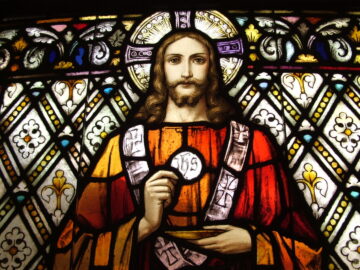Franciscan Friar Fr. Paul Gallagher reflects on the Fourth Sunday of Ordinary Time. Do you think any of the disciples ever thought of themselves as blessed in their here and now, or do you think the disciples were mostly looking for blessing on a day yet to come?
The content is edited by Franciscan Sister of Christian Charity Sister Anne Marie Lom and Joe Thiel. The excerpts from the Sunday readings are prepared by Joe Thiel. To read or download the complete pdf with excerpts for your prayer, please click here Franciscan Gospel Reflection January 29 2023. Excerpts are from the Lectionary for Mass for Use in the Dioceses of the United States of America, second typical edition © 2001, 1998, 1997, 1986, 1970 Confraternity of Christian Doctrine, Inc., Washington, DC. Used with permission. All rights reserved. No portion of this text may be reproduced by any means without permission in writing from the copyright owner.
Photo: The ‘Bread of Life’ stained glass window is from St Lucy Parish in Racine, Wisconsin. The windows were originally from now closed St Anne in Milwaukee, which served as the temporary Cathedral. Fr. Thomas Vathappallil, pastor of this vibrant faith community, invites: “Jesus is waiting for us in Reconciliation, in Adoration, and especially at the heart of all we do … the Holy Eucharist, our true spiritual nourishment.”
Matthew 5:1-12a
 When Jesus saw the crowds, he went up the mountain, and after he had sat down, his disciples came to him. He began to teach them, saying:
When Jesus saw the crowds, he went up the mountain, and after he had sat down, his disciples came to him. He began to teach them, saying:
“Blessed are the poor in spirit, for theirs is the kingdom of heaven.
Blessed are they who mourn, for they will be comforted.
Blessed are the meek, for they will inherit the land.
Blessed are they who hunger and thirst for righteousness, for they will be satisfied.
Blessed are the merciful, for they will be shown mercy.
Blessed are the clean of heart, for they will see God.
Blessed are the peacemakers, for they will be called children of God.
Blessed are they who are persecuted for the sake of righteousness, for theirs is the kingdom of heaven.
Blessed are you when they insult you and persecute you and utter every kind of evil against you falsely because of me. Rejoice and be glad, for your reward will be great in heaven.”
Background:
 Last week Jesus learned of the arrest of John the Baptist and moved from the small town of Nazareth to Capernaum, which was located on major trade routes, to begins his ministry of preaching and curing the sick. He also called his first disciples: Peter, his brother Andrew, and the two brothers James and John. In the two verses between last week’s text and the gospel for this week, Matthew states that Jesus’ fame had spread throughout Syria and people were bringing their sick to him.
Last week Jesus learned of the arrest of John the Baptist and moved from the small town of Nazareth to Capernaum, which was located on major trade routes, to begins his ministry of preaching and curing the sick. He also called his first disciples: Peter, his brother Andrew, and the two brothers James and John. In the two verses between last week’s text and the gospel for this week, Matthew states that Jesus’ fame had spread throughout Syria and people were bringing their sick to him.
In the gospel for this week, Jesus begins his instruction to his disciples. (For the next six weeks, the gospel text will be taken from Jesus’ instruction to his new disciples.) Jesus expects the disciples to learn from him and to shape their lives by his teachings. As Matthew describes Jesus’ instruction to his followers, he is drawing on his community’s familiarity with Moses, who went up the mountain and brought back the commandments from God. Here, Jesus takes his disciples up the mountain and sits with them, assuming the position of a teacher. But he is not laying down a new set of commandments, rather he is teaching in the tradition of a wisdom teacher.
Each of the Beatitudes begins with same, “Blessed are…” Because there is not one word that adequately translates the Hebrew or Greek, there is a need to understand what is being expressed here with each of the beatitudes. First, the Beatitudes are not just simple statements. Nor are they statements of hope about the future when the fullness of the Kingdom of God is established, or about that day when one becomes fully present to God. They are explanations about what is in the present. The blessing then is not affected by the other circumstances of life. The blessing described in the beatitudes comes to the disciples out of a profound awareness that Jesus is walking with them. This bond, like the covenant, continues no matter the circumstances the disciple might experience.
The values that Jesus advocates in the beatitudes run contrary to those held by society of his day. Throughout Matthew’s gospel, Jesus is described as the one who is poor in spirit, mourning, meek, hungering for righteousness, merciful, pure of heart, and a peacemaker. These beatitudes look to a future time when God’s presence will be brought to fullness on earth. That future day has begun to appear in the person of Jesus. Jesus teaches his followers, by the example of his own life, how to live their lives reflecting the values of the reign of God. Thus, hope for the reign of God will continue to be present and unfold in the world through his followers.
Reflection Questions:
- Take a few minutes to think about the early disciples. What strikes you about them?
- Then what strikes about you about how Jesus interacts with them?
- Do you think any of the disciples ever thought of themselves as blessed in their here and now, or do you think the disciples were mostly looking for blessing on a day yet to come?
- Have you ever experienced blessings during a painful period or crisis in your life? What did you learn about God’s presence during those times? What did you learn about your own desires?
- Who are the people who have reminded you that you are among those blessed by God?
- How would you like to respond to God as you hear Jesus’ instruction to his disciples in this text? Can you take some time to talk to God about your questions, thoughts, and desires?
Photo: St. Francis Chapel door window, Franciscan Sisters of Christian Charity, Holy Family Convent, Manitowoc, Wisconsin,


